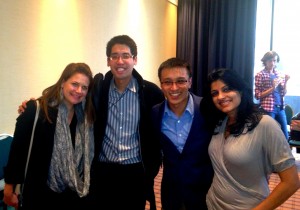Internationalizing Medical & Health Education
At the recent NAFSA Conference for international educators, the Colloquium on Internationalizing Medical Schools proved to be a forum marked by many thoughtful remarks, especially those of the opening speaker Edwin Trevethan, MD MPH. Yet nothing struck me as much as the name of the school he heads– Dr. Trevethan is dean of the St. Louis University College for Public Health & Social Justice. The social justice part piqued my interest. Social Justice is a term that did not receive enough exposure during my undergraduate and medical education, despite dedicated studies about global health, underserved care, and health equity. 
Importance of Social Justice in Health Evolving
Why hasn’t this term gotten the play it deserves? What does it mean anyways? One of my favorite definitions of Social Justice is a “historically deep and geographically broad” understanding of gross inequities, power imbalances, and underlying causes of ill health. Dr. Josh Freeman, the creator of the blog ‘Medicine & Social Justice’ offers further insight into definitions of justice, social justice, and how they relate to health and health care. Social Justice has also been studied as one of the key ethical principles for students wanting to be involved in Global Health. Increasingly there has been discussion on whether social justice should be a factor when selecting students for admission into medical school.
I think the reason Social Justice has not always made it into our medical and educational syntax is that it encompasses the utmost complexity. Particularly in medicine we like things that we can boil down to cause and effect, test while controlling for variables, and fix with evidence-based antidotes. Social justice doesn’t allow us to be logical and create such neat solutions. Social justice demands we consider a host of influences on health, wellness, and disease. It requires that we humble ourselves. It requires we admit that problems causing health inequities worldwide defy the scope of one solitary discipline, or the involvement of just one prestigious university.
I want to commend St. Louis University and Dr. Trevethan’s leadership for their insight in going so far as to include social justice in name of their school of public health. They, alongside other leaders such as CFHI partner association American Medical Student Association, demonstrate the fundamental ability to embrace the complexity of global health, and not unlike CFHI persevere with programming and partnerships that give social justice its due attention–both as a goal and as a lens through which to understand health.
At the annual NAFSA: Association of International Educators Conference CFHI was represented along with over 8,000 professionals who come together in late May each year to network and learn about today’s issues related to the fields of study and interning abroad.


